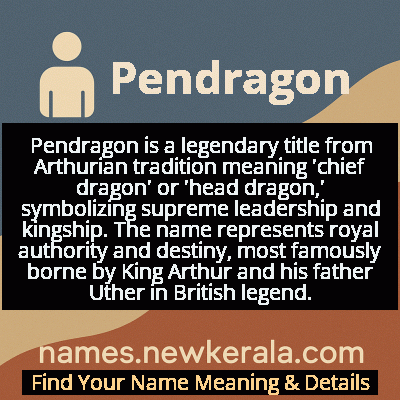Pendragon Name Meaning & Details
Origin, Popularity, Numerology Analysis & Name Meaning of Pendragon
Discover the origin, meaning, and cultural significance of the name PENDRAGON. Delve into its historical roots and explore the lasting impact it has had on communities and traditions.
Name
Pendragon
Gender
Male
Origin
Arthurian
Lucky Number
4
Meaning of the Name - Pendragon
Pendragon is a legendary title from Arthurian tradition meaning 'chief dragon' or 'head dragon,' symbolizing supreme leadership and kingship. The name represents royal authority and destiny, most famously borne by King Arthur and his father Uther in British legend.
Pendragon - Complete Numerology Analysis
Your Numerology Number
Based on Pythagorean Numerology System
Ruling Planet
Uranus (Rahu)
Positive Nature
Strong sense of order, loyal, practical, and disciplined.
Negative Traits
Stubborn, overly serious, rigid, and prone to feeling restricted.
Lucky Colours
Blue, gray.
Lucky Days
Saturday.
Lucky Stones
Blue sapphire.
Harmony Numbers
1, 7, 8.
Best Suited Professions
Managers, engineers, accountants, organizers.
What People Like About You
Dependability, discipline, practicality.
Famous People Named Pendragon
Uther Pendragon
Legendary King
Father of King Arthur and founder of the Pendragon dynasty in British legend
Arthur Pendragon
Legendary King
Most celebrated British monarch in legend, established Camelot and Knights of the Round Table
John Timothy Rothwell (Arthur Pendragon)
Modern Activist
British activist who legally changed his name and leads modern Druidic ceremonies at Stonehenge
Name Variations & International Equivalents
Click on blue names to explore their detailed meanings. Gray names with will be available soon.
Cultural & Historical Significance
The name evolved beyond a simple family name to represent the entire concept of British kingship and the unification of the island against Saxon invaders. Throughout medieval literature, including Thomas Malory's 'Le Morte d'Arthur,' the Pendragon name became synonymous with ideal rulership, justice, and the establishment of chivalric codes. The cultural impact extends to modern times, where Pendragon continues to represent archetypal leadership, destiny, and the romantic ideal of the once and future king who will return in Britain's hour of need. This enduring legacy has made Pendragon one of the most recognizable names in Western literature and mythology.
Extended Personality Analysis
The name Pendragon evokes personality traits of natural leadership, charisma, and a profound sense of destiny. Those associated with this name typically exhibit strong moral convictions, strategic thinking, and the ability to inspire loyalty in others. They often carry themselves with an air of authority that feels both earned and innate, much like the legendary kings who bore this name. There's usually a combination of warrior spirit and diplomatic skill, enabling them to navigate complex political landscapes while maintaining their principles.
Pendragon personalities tend to be visionary, seeing possibilities where others see obstacles, and they possess the determination to turn their visions into reality. However, this strong sense of purpose can sometimes manifest as stubbornness or an unwillingness to compromise when they believe their course is morally right. They typically bear responsibility gracefully but may struggle with the isolation that often accompanies leadership positions. Their greatest strength lies in unifying diverse groups under a common cause, while their challenge is balancing absolute conviction with the flexibility needed for effective governance. The name suggests someone destined for significant impact, whether in their immediate community or on a larger stage.
Modern Usage & Popularity
In contemporary usage, Pendragon remains relatively rare as a given name but maintains strong presence in specific contexts. It appears most frequently as a surname or in creative works rather than in birth registries. The name enjoys niche popularity among enthusiasts of Arthurian legend, historical reenactors, and within fantasy literature and gaming communities where it often denotes characters of royal or heroic stature. While not ranking in official baby name statistics, it has seen occasional use as a first name, particularly among parents seeking unique, historically resonant names with literary connections. Modern usage also extends to middle names, allowing incorporation of its legendary associations without the weight of daily use. The name appears in various business contexts, particularly those with British or Celtic themes, and maintains cultural relevance through continued adaptations of Arthurian stories in film, television, and literature.
Symbolic & Spiritual Meanings
Pendragon carries rich symbolic meaning as the embodiment of sovereign power, destiny, and protective leadership. The dragon component symbolizes wisdom, power, and guardianship in Celtic tradition, while the 'pen' prefix represents ultimate authority and headship. Together, they create a symbol of the ideal ruler who combines martial strength with wise governance. The name represents the concept of divine right to rule, where leadership is both earned through capability and granted by destiny or supernatural signs. Symbolically, Pendragon also embodies the idea of legacy and continuity, suggesting that true leadership establishes institutions and values that endure beyond one lifetime. It represents the unification of diverse peoples under a common cause and the responsibility that accompanies great power. In modern contexts, the name has come to symbolize archetypal leadership, the romance of destiny, and the enduring power of mythological ideals in contemporary consciousness.

